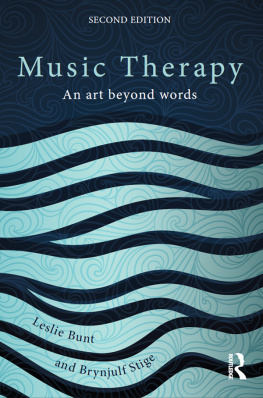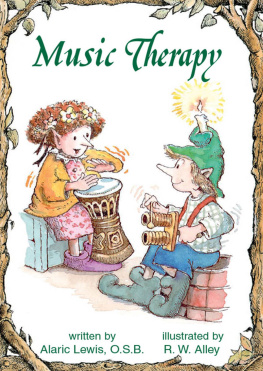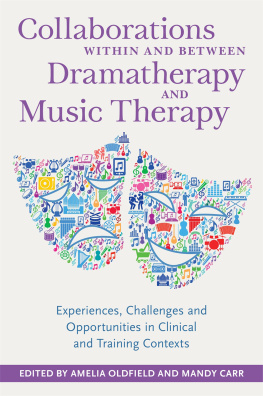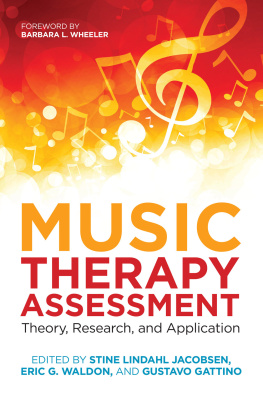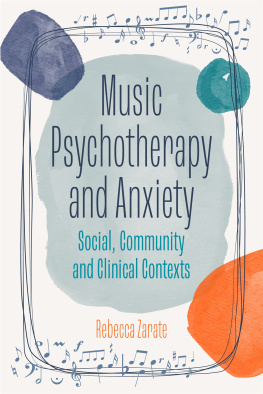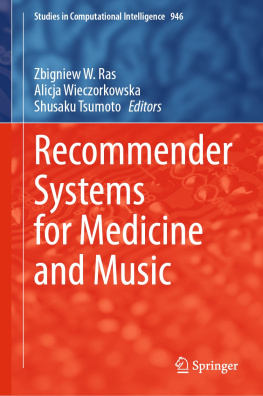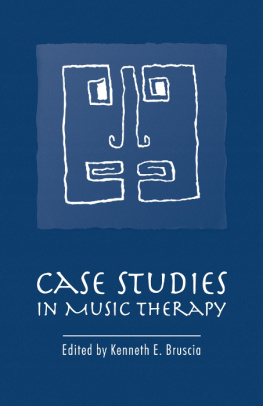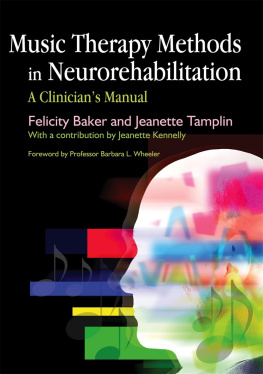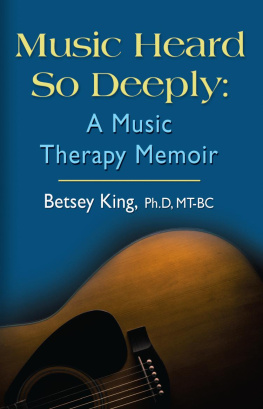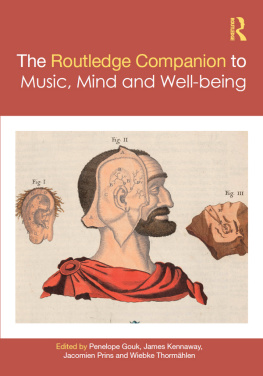Music Therapy
Music therapy is recognised as being applicable to a wide range of healthcare and social contexts. Since the first edition of Music Therapy: An art beyond words, it has extended into areas of general medicine, mainstream education and community practice. This new edition revises the historical and theoretical perspectives and recognises the growing evidence and research base in contemporary music therapy.
Leslie Bunt and Brynjulf Stige document the historical evolution of music therapy and place the practice within seven current perspectives: medical, behavioural, psychodynamic, humanistic, transpersonal, culture-centred and music-centred. No single perspective, individual or group approach is privileged, although the focus on the use of sounds and music within therapeutic relationships remains central. Four chapters relate to areas of contemporary practice across different stages of the lifespan: child health, adolescent health, adult health and older adult health. All include case narratives and detailed examples underpinned by selected theoretical and research perspectives. The final two chapters of the book reflect on the evolution of the profession as a community resource and the emergence of music therapy as an academic discipline in its own right.
A concise introduction to the current practice of music therapy around the world, Music Therapy: An art beyond words is an invaluable resource for professionals in music therapy and music education, those working in the psychological therapies, social work and other caring professions, and students at all levels.
Leslie Bunt is Professor in Music Therapy at the University of the West of England, Bristol. He is a Primary Trainer in Guided Imagery and Music and a freelance conductor. Leslies current practice and research interests focus on music therapy and adult cancer care, and his previous books include The Handbook of Music Therapy, co-edited with Sarah Hoskyns (Routledge, 2002).
Brynjulf Stige is Professor in Music Therapy at the Grieg Academy, University of Bergen, Norway. He was founding editor of the Nordic Journal of Music Therapy and founding co-editor of Voices: A World Forum for Music Therapy. His previous books, including Invitation to Community Music Therapy, co-authored with Leif Edvard Aar (Routledge, 2012), have explored relationships between music therapy, culture and community.
Music Therapy
An art beyond words
Second edition
Leslie Bunt and Brynjulf Stige

Second edition published 2014
by Routledge
27 Church Road, Hove, East Sussex, BN3 2FA
and by Routledge
711 Third Avenue, New York, NY 10017
Routledge is an imprint of the Taylor & Francis Group, an informa business
2014 Leslie Bunt and Brynjulf Stige
The right of Leslie Bunt and Brynjulf Stige to be identified as authors of this work has been asserted by them in accordance with sections 77 and 78 of the Copyright, Designs and Patents Act 1988.
All rights reserved. No part of this book may be reprinted or reproduced or utilised in any form or by any electronic, mechanical, or other means, now known or hereafter invented, including photocopying and recording, or in any information storage or retrieval system, without permission in writing from the publishers.
Trademark notice: Product or corporate names may be trademarks or registered trademarks, and are used only for identification and explanation without intent to infringe.
First edition published by Brunner-Routledge 1994
British Library Cataloguing in Publication Data
A catalogue record for this book is available from the British Library
Library of Congress Cataloging-in-Publication Data
Bunt, Leslie, author.
Music therapy : an art beyond words / Leslie Bunt and Brynjulf Stige.
Second edition.
pages cm
Includes bibliographical references and index.
1. Music therapy. I. Stige, Brynjulf, author. II. Title.
ML3920.B85 2014
615.85154-dc23
2013042864
ISBN: 978-0-415-45068-3 (hbk)
ISBN: 978-0-415-45069-0 (pbk)
ISBN: 978-1-315-81798-9 (ebk)
Typeset in Times
by Keystroke, Station Road, Codsall, Wolverhampton
Contents
One of the privileges of being a music therapist is the opportunity to work musically with people who have much to teach about courage, endurance and beauty. Our warmest thanks go to all the patients and participants from whom we have been learning over the years. There is also a large group of colleagues and friends who deserve our gratitude. The community of music therapy the invisible college we talk about in Chapter 9 has been an extremely important source of inspiration for us. We thank the many students we have worked with over the years.
Special thanks go to Brian Abrams, who read the whole manuscript and gave us invaluable feedback on the potential relevance and usefulness of this book. We also want to express our special thanks to the other music therapy colleagues who have read and commented on various chapters of the manuscript: Simon Gilbertson, Denise Grocke, Bob Heath, Sarah Hoskyns, Jane Lings, Katrina McFerran, Hanne Mette Ridder, Daphne Rickson, Gro Trondalen, Cathy Warner and Barbara Zanchi. Thanks to all for constructive critique and suggestions. We are especially grateful to Barbara Zanchi and Simon Gilbertson for providing case narratives and additional material. Thanks to Kate Cullen for compiling the index. We thank members of our families and friends for their continual support, especially Susan Pontin, who read every word of the whole manuscript more than once and contributed greatly in the stylistic integration of our two voices. Laura Bunt commented constructively on a final draft of a chapter, Torgeir Stige helped us with the two figures in Chapter 8 and Christopher Gray answered one of our scientific questions. Our appreciation goes to the editorial team at Routledge, Joanne Forshaw and Susanna Frearson, for their patience and trust. Finally but not least, we thank our readers, who may be the beginner music therapist or the curious enquirer. Our imagined dialogues with you have helped us retain focus and have nurtured reflections on what music therapy is and could be.
Music therapy is a relatively new profession. It is being increasingly recognised at a time when there has never been such a variety of music available to so many people. These two statements summarised the situation in 1994 when the first edition of this book was published. The first statement remains true even though the changes and developments in the past twenty years have been enormous. The second statement is truer than ever. Musics availability in contemporary society creates many new possibilities for music therapy but also new responsibilities.
Most people today have access to music. We may go regularly to listen to music in concert halls, jazz clubs or opera houses, or at folk or rock festivals. We may perform music as members of a local choir, band or orchestra. Music of all styles is also available at the push of a button in the comfort of our own homes or increasingly, in this digital age, as we move about our daily business, not only listening to our own preferred music but also being exposed to background music in cafs and shops. Music is likewise very much a feature of our experience of the cinema and it plays a major part in the advertising industry. Increasing ease of travel opens up opportunities to meet people from all corners of the globe, to listen to, take part in and learn about more music from different cultures, including from oral-based traditions. Since the publication of the first edition, the invention of the internet has made it easier to explore music from all over the world. We would need more than our one lifetime to become familiar with a small fraction of all of this music.
Next page
